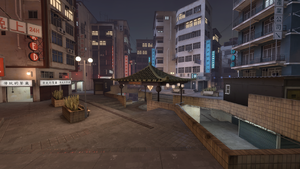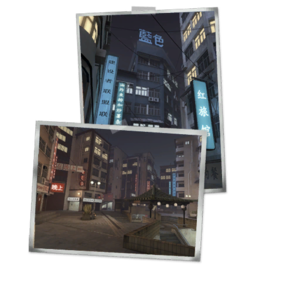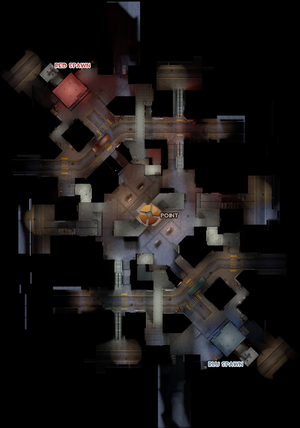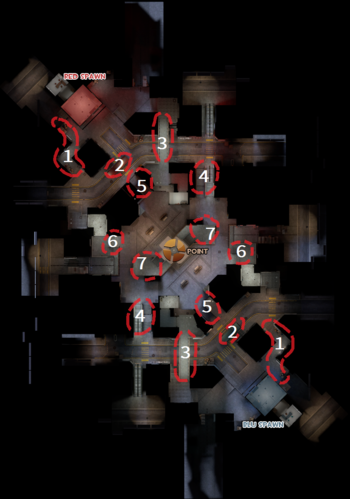| “ |
Were you thinking, "I really like playing TF2, but I wish there was a King of the Hill map set in a Chinese cityscape"? Well, your oddly specific and scarily prescient dreams have come true! Introducing Kong King - TF2’s first city-themed map! — TF2 Official Blog
|
” |
Kong King is a community-created King of the Hill map commissioned by Valve[1] with a radially symmetric layout. Teased in the Triad Pack update, it was released in the August 10, 2012 Patch.
Kong King takes place in the middle of an unspecified Chinese city. It is the first official map released by Valve set in an urban environment. It is based on the video game Sleeping Dogs. It is a largely two-story map, with a covered control point on the second floor in the middle. The map has a very vertical design, with multiple signs, and other outcroppings for a crafty player to jump onto. There is a lot of detail in the map, including signs in Chinese, apartment buildings overlooking the map with air conditioners in the windows, boxes littered about, and abandoned team-colored buses on either side of the map.
Locations
Note: If you are having trouble with finding the locations listed here, see the Helpful overview section to see their exact position marked on the map.
The Spawn:
- Each team's Spawn is located within the ground floor of a multistorey building. Each spawn room has three exits:
- The front exit that leads directly to the street that stretches across the width of each team's side.
- The right exit brings the player through The Alleyways, a narrow zigzagging path that leads to the Side Stairs.
- The elevated left exit leads to a large open area with a shorter route to the control point through The Covered Bridges and a longer flanking route through The Double Stairs.
Outside view of BLU spawn.
Inside view of BLU spawn.
Inside view of RED spawn.
Outside view of RED spawn.
The Backstreets
- The Buses: Directly in front of the front spawn doors of either team, there is a team-colored bus as cover on the street.
- The Streets: Two wide streets running in front of either team's spawn.
- The Short Stairs: The staircase up is the direct route to the park from spawn, just beyond the buses. The ramp down is the direct route to that side's Pillar Room.
- The Covered Bridges: Wide, straight covered bridges perpendicular to each team's street that provides a shorter route towards the point.
- The Double Stairs: A long flanking route containing two parallel sets of stairs, one covered, one uncovered.
The short stairs on BLU side which leads directly to control point.
The Covered Bridge provides a shorter path to control point.
The Double Stairs on BLU side.
The Double Stairs on RED side.
The lower paths
- The Small Tunnels: Rooms accessed by a door underneath the Covered Bridges, or a door in one of the Tunnels.
- The Tunnels: The underground path from the bus to one of the Pillar Rooms.
- The Pillar Rooms: Two symmetrical rooms under the park with staircases going up directly to the point.
- The Side Stairs: Two switchback stairs on either side of the map, connecting the Pillar rooms with the Park.
The tunnels under the park.
The stairs on the right leads to the Side Stairs.
The view of the Pillar Rooms.
The Side Stairs on RED side.
The Side Stairs as viewed from The Park.
- The Park: The center of the map, with park benches, plants, and two small sheds as the only cover. A Chinese resting stand houses the control point.
The central control point.
Helpful overview
1.Alleyways
2.Buses
3.Covered Bridge
4.Double Stairs
5.Short Stairs
6.Side Stairs
7.Pillar Rooms
Strategy
Control Point timing
| Control Point
|
×1
|
|
| ×2
|
|
| ×3
|
|
| ×4
|
|
Update history
August 10, 2012 Patch
- Added Kong King to the game.
August 11, 2012 Patch
- Added the
.nav file for Kong King.
September 4, 2012 Patch
- Added some geometry to hide floating staircases outside of playspace.
- Performance improvements from prop reduction, additional surfaces tagged as nodraw, and reduced overlay counts.
- Fixed some building faces where extra faces were being generated behind windows/etc due to spaces in geometry.
September 21, 2012 Patch
- Reflections fixed for the floors and some glass windows.
- Modified model file for the sign 6 through 9 to avoid Red signs on Blu side of the map.
- Modified light pole to merge bulb and pole into a single model for perf.
- Fixed location where mini-Sentry Guns can shoot through a bush without being seen.
- Clipping pass.
- Added glass on footbridge roof and lights nearby.
- Prop reduction for perf.
- Some props changed to non-solid for player mobility.
- Adjusted health and ammo in various spots.
July 10, 2013 Patch
- Health and ammo packs now match on Red and Blu sides of the map
- Players can no longer build in spawn doors
Trivia
- There are two signs that bear Chinese text for "Reliable Excavation Demolition" (可靠的開挖破坏) and "Builders League United" (建设者联盟联合).
- Other signs read "Fish and Chips" (油炸魚排加炒薯條), "Traditional Restaurant" (傳統的餐廳), "Red Pharmacy" (紅色藥房), "Bar" (酒吧), "Civil Engineering Industrial Company" (土木工程產業公司), "Hotel" (酒店), "Old Antique Dealer" (老古董商), "Fresh Fish Market" (新鮮的魚店), "Liquor Store" (酒精酒品店), "Chinese Noodle House" (中国面馆), "Red Hotel" (红旅馆), "Bookstore" (書店), "Optician" (配镜), "Blue Infrastructure" (藍色基建), "Coyote Gray" (郊狼灰色) and "Dog's House" (狗的家). Some signs are references to Hong Kong, such as "Underground Railway" (地鐵)
- The map is based on Hong Kong, the city in which Sleeping Dogs takes place.[2]
- The control point is located in a Chinese resting stand.
- Some of the signs use Simplified Chinese lettering, which is uncommon in Hong Kong, which mainly uses Traditional Chinese.
Gallery
The street, and the bus in front of BLU spawn.
One of the covered bridges, located upstairs from the BLU resupply.
The Park, and the control point, in the center.
The Pillar room, showing the staircase leading directly to the point.
"Reliable Excavation Demolition"
Alternate "Old Antique Dealer" sign
"Chinese Noodle House" on BLU street
"Chinese Noodle House" on RED street
"Chinese Traditional Restaurant"
"Civil Engineering Industrial Company"
External links
References

















































